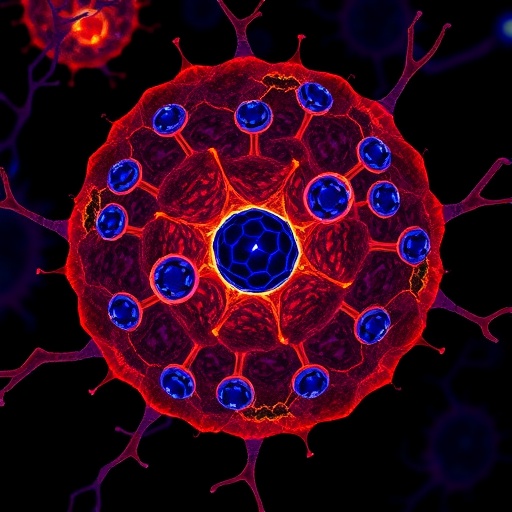In a groundbreaking study published in the June 2025 issue of BMC Cancer, a comprehensive pan-cancer analysis has shed new light on the oncogenic functions of the zinc finger protein ZNF703 and its intricate role in modulating tumor immunity. This investigation, led by Shi, Lie, Li, and colleagues, delves deep into the molecular mechanisms by which ZNF703 influences tumorigenesis and the tumor microenvironment, revealing potential avenues for novel cancer immunotherapies and prognostic tools.
ZNF703, a member of the NET/NLZ family of transcriptional regulators, has long been recognized for its importance in embryonic development and cancer progression. However, until now, its pan-cancer impact, especially on the immune landscape within tumors, remained largely enigmatic. This study presents an extensive analysis across multiple cancer types, bringing clarity to the functional significance of ZNF703 overexpression and its correlation with clinical outcomes.
One of the most striking findings is the positive correlation between elevated ZNF703 expression and the promotion of cancer progression across diverse malignancies. High levels of ZNF703 were consistently associated with poor prognosis, reinforcing its role as a potential oncogene. The study meticulously examined patient datasets and molecular profiles to validate these observations, establishing a robust framework for considering ZNF703 as a biomarker in clinical oncology.
Beyond its direct involvement in cancer cell biology, ZNF703 was found to play a crucial role in shaping the tumor microenvironment (TME). Notably, tumors with elevated ZNF703 demonstrated significant infiltration by immune cells, including cancer-associated fibroblasts (CAFs), CD8+ cytotoxic T cells, and M2-polarized macrophages. These varied immune populations, often with conflicting roles in tumor defense and progression, underscore the complexity of ZNF703’s influence on tumor immunity.
At the molecular level, ZNF703 operates as a transcriptional regulator, binding to specific promoter regions to suppress the expression of key immune modulatory genes such as CD274 (encoding PD-L1), ICAM1, and CXCL3. This repression may facilitate immune evasion by tumors, allowing them to escape immune surveillance and foster a more permissive environment for growth and metastasis. These insights into ZNF703’s transcriptional targets highlight novel mechanisms of tumor immune escape.
Intriguingly, the study identified a cluster of functionally interconnected hub genes associated with ZNF703, including DDHD2, LSM1, and BAG4. These genes appear to co-localize with ZNF703 within amplicons on chromosome 8p11-p12, a region frequently amplified in various cancers. The co-amplification and potential cooperation among these genes suggest a coordinated oncogenic program that drives tumor initiation and progression, adding a new dimension to our understanding of chromosomal aberrations in cancer.
The integration of genomic and transcriptomic data in this pan-cancer study allowed the researchers to delineate how ZNF703-dependent networks might orchestrate both intrinsic cancer cell proliferation and extrinsic immune modulation. Such dual roles position ZNF703 as a pivotal regulator at the nexus of tumor growth and immune evasion, making it an attractive candidate for therapeutic targeting.
The implications of these discoveries are profound for cancer immunotherapy. Current strategies, including immune checkpoint blockade targeting PD-L1, may be complemented by interventions aimed at disrupting ZNF703 function. By reversing the suppression of immune-enhancing genes, such therapies could invigorate antitumor immune responses, overcoming resistance mechanisms related to ZNF703 activity.
Furthermore, the identification of ZNF703 as a biomarker has important diagnostic and prognostic value. Its expression levels could potentially stratify patients according to risk and responsiveness to immunotherapies, guiding personalized treatment approaches. Early detection of ZNF703 amplification or overexpression might also enable interventions at a stage when tumors are more susceptible to immune attack.
This study’s multilayered approach, encompassing epigenetic regulation, gene expression profiling, and immune cell infiltration analyses, offers a comprehensive overview of ZNF703’s multifaceted role in cancer. It underscores the necessity of looking beyond cancer cells alone to understand the dynamic and reciprocal interactions within the tumor ecosystem.
The findings also open avenues for further research to dissect the precise molecular pathways by which ZNF703 modulates its target genes and interacts with co-amplified partners. Understanding these pathways could illuminate new druggable targets and biomarkers within the chromosomal 8p11-p12 amplicon, leading to combinational therapies enhancing efficacy.
Moreover, the dual impact of ZNF703 on both tumorigenesis and immune response provides a paradigm for studying other transcription factors implicated in cancer. This could stimulate broader research into how oncogenes manipulate the immune microenvironment to promote disease progression.
As the realm of cancer research increasingly emphasizes the importance of the immune system in tumor control, studies like this reinforce the potential of immunomodulatory transcription factors as critical nodes in oncogenic networks. Targeting such nodes could revolutionize the design of next-generation cancer treatments.
In summary, the pan-cancer analysis led by Shi et al. reveals ZNF703 as a crucial oncogene that not only drives tumor progression but also manipulates tumor immunity through direct transcriptional repression of immune-related genes. Its cooperation with co-amplified genes in the chromosome 8p11-p12 region highlights a complex, integrated oncogenic program.
The translational potential of these findings awaits validation in clinical trials, but the road ahead is promising. Future therapies aimed at mitigating ZNF703 activity may simultaneously inhibit tumor growth and reinstate effective antitumor immune responses, offering hope for improved outcomes in diverse cancer types.
With cancer continuing to be a leading cause of mortality worldwide, breakthroughs such as the elucidation of ZNF703’s dual oncogenic and immunomodulatory roles pave the way for innovative therapeutic strategies. This study exemplifies the power of pan-cancer analyses in unveiling universal cancer drivers and shaping the future of precision oncology.
Subject of Research: Oncogenic role and immune regulatory functions of ZNF703 across multiple cancer types.
Article Title: Pan-cancer analysis of the oncogenic role of ZNF703 in regulating tumor immunity.
Article References: Shi, X., Lie, J., Li, R. et al. Pan-cancer analysis of the oncogenic role of ZNF703 in regulating tumor immunity. BMC Cancer 25, 1437 (2025). https://doi.org/10.1186/s12885-025-14636-5
Image Credits: Scienmag.com




